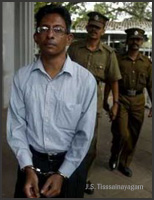 A Statement by the Asian Human Rights Commission
A Statement by the Asian Human Rights Commission
The Asian Human Rights Commission is saddened, disappointed and shocked but not surprised at the judgment of the High Court of Colombo in sentencing J.S. Tisssainayagam to 20 years of rigorous imprisonment for a simple piece of writing which he had done and which was interpreted as aiding and abetting terrorism. The AHRC is not surprised by this judgment because at the very inception of this case the AHRC pointed out that this is purely a political case, the first of its kind in which the accused, Mr. Tisssainayagam’s guilt or innocence was not an issue but an opportunity to send a message to society on the changed circumstances of the country where freedom of expression does not matter at all. That was the real aim of this case. It is the sort of prosecution that could have happened under the regime of Joseph Stalin through the prosecutor, Andrei Vyshinsky.
In Vyshinsky’s trials the outcome was predetermined. The trials of the 1930s were known worldwide as show trials. Those actually accused were not really the targets of the proceedings. The accused were mere exhibits to be advertised before the rest of Russia in order to pass a message to the people about the fundamental beliefs that Stalin wanted to impose on society. Vyshinsky’s biographer Arkady Vaksberg writes that the “purpose of the trial had not been to disgrace or, indeed, to annihilate some of the accused but to create a precedent and pave the way for a psychological attack on the population.”
Tisssainayagam has been selected for a show trial where there was not even any evidence to base a charge on. The particular passages which were arbitrarily selected from his writings did not represent any attempt to raise feelings of racism or to instigate people to violence on the basis of race. The text was selected as the pretext and there was no genuine thought in this prosecution at all.
What the case points to is the illusions of the liberals both in Sri Lanka and abroad who fail to see a persecution staged as a show trial. The illusion that somehow things may turn out and that there would be a fair trial was the comfort zone in which many people were resting, unwilling to accept that justice is dead in Sri Lanka and that the executive can manipulate and get whatever verdict it wants.
The greatest loser in this case is not J.S. Tisssainayagam it is the justice system and the judiciary in Sri Lanka that has suffered the greatest loss which would be hard for it to overcome. Even this is not a huge surprise for most people in Sri Lanka. They know that justice has been dead for a long time in their country.
The Tisssainayagam case will also remain the most glaring proof of the absence of freedom of expression in Sri Lanka. The memory of this case will shame so many journalists and media men in the country who have found it possible to lick the very feet of the executive which has completely destroyed the freedom of expression in the country. Some have fought back and lost their lives and some finally fled for their own safety. But this has also created a paradise for those who live by their contribution to misinformation and suppression of freedoms.
We urge the local and international community to condemn the judgment and the sentence in Tisssainayagam’s case and to call for his unconditional release. We also urge the local and international community to grasp the reality that justice is dead in Sri Lanka and the freedom of expression and the media which has also been killed.
Justice and media freedom in Sri Lanka is like the phantom limb; a dream of an amputee who still believes that his limbs are intact. The reminder of the Tisssainayagam case should always be associated with the image of the phantom limb.
